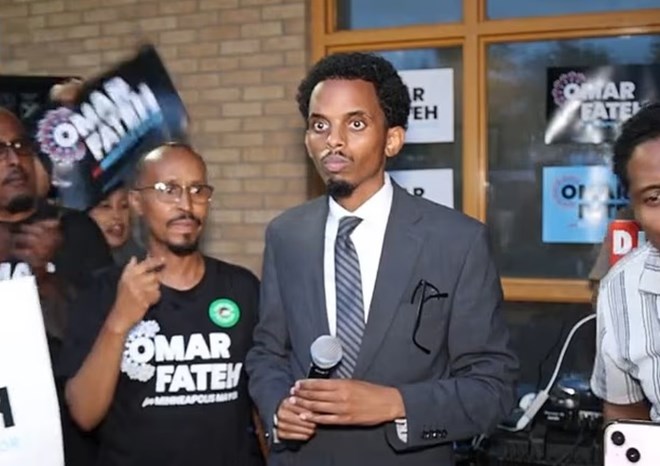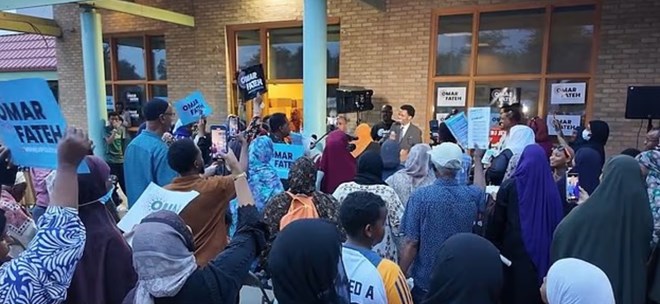
Tuesday August 19, 2025

Somali American mayoral candidate Omar Fateh addresses supporters during a community rally at the Brian Coyle Center in Minneapolis on Sunday, Aug. 18, 2025. The event, attended by dozens of Somali voters, underscored the growing political influence of the Somali diaspora in the city. Credit: Somali TV Minnesota
MINNEAPOLIS, Minn (HOL) — Hundreds gathered Sunday night at the Brian Coyle Center, a community hub in Minneapolis’s Cedar-Riverside neighbourhood — often called “Little Mogadishu” — to support Omar Fateh, the first Somali American elected to the Minnesota State Senate and now the leading candidate in the city’s mayoral race. Fateh’s unlikely bid to become mayor of Minneapolis has become a rallying point not just for progressives, but for a global diaspora watching closely.
Fateh’s mayoral campaign, once considered a long shot, has surged after
securing the Democratic-Farmer-Labor (DFL) Party’s official endorsement in late July. His rise has redrawn political battle lines in Minnesota’s most populous city, unseating the party establishment and positioning him as the standard-bearer of a grassroots coalition powered in no small part by Somali and first-generation voters.
The rally last Sunday was both a celebration and an affirmation. Dozens turned out in a display of synchronized pride and political purpose. Supporters wore t-shirts bearing Fateh’s name in bold type; others held signs blending solidarity with Gaza and calls for economic justice. Many greeted one another in Somali, switching fluidly between languages, an embodiment of a community that has, over decades, stitched its culture into the fabric of American urban life.
“This campaign belongs to all of us,” Fateh told the crowd, switching briefly into Somali to repeat the phrase, a deliberate gesture that drew a cheer.
Born to Somali parents and raised in the U.S., Fateh is no stranger to the balancing act that defines many diaspora lives: carrying the weight of ancestral memory while navigating the expectations of a new homeland. In 2020, he became the first Somali and Muslim elected to Minnesota’s State Senate. Now, at 35, he is vying to become the first Somali mayor of a major U.S. city, and perhaps the first to do so with a platform that marries economic justice, police reform, and immigrant protection under a democratic socialist banner.
His candidacy has
invited comparisons to Zohran Mamdani, the Ugandan-Indian New York lawmaker credited with building a similar leftist wave among immigrants in Queens. Fateh himself has called Mamdani a friend and ally. Their parallel platforms include a $20 minimum wage, rent stabilization, and severing ties between local police and federal immigration enforcement, policies that resonate deeply in communities where deportation, housing insecurity, and economic precarity are lived realities.

Somali American mayoral candidate Omar Fateh addresses supporters during a community rally at the Brian Coyle Center in Minneapolis on Sunday, Aug. 18, 2025. The event, attended by dozens of Somali voters, underscored the growing political influence of the Somali diaspora in the city. Credit: Somali TV Minnesota
But not all are cheering. Fateh’s ascent has provoked resistance within the DFL, particularly from supporters of incumbent Mayor Jacob Frey, who is now formally contesting the party’s endorsement process. A technical mishap during the July 21 convention led to 176 delegate votes being excluded from the first ballot, an oversight that critics argue skewed the outcome. Frey’s campaign urged its delegates to walk out before a final vote was held by a show of hands, effectively ceding the endorsement to Fateh.
The party’s rules committee is expected to rule soon on whether the endorsement will stand. A reversal could fracture the DFL and risk alienating its younger, more diverse base, a base that Fateh’s campaign has mobilized with uncommon intensity. A letter signed by over 200 delegates in Fateh’s camp warned party leaders not to disenfranchise “the very voters who deliver statewide wins.”
For many Somali Americans, the challenge cuts deeper than procedural wrangling. It touches on questions of belonging, legitimacy, and power. Fateh’s campaign is about what it means to be seen and counted in a city still reckoning with its own fault lines of race, policing, and inequality.
In a nation increasingly divided over identity, Omar Fateh’s campaign offers something rare: a vision that insists inclusion is not assimilation, and that political power can be remade and not inherited.
Whether that message carries him to City Hall remains to be seen. But on that Minneapolis night, under the fluorescent hum of the Coyle Center’s lights, a community long on the margins made it clear: they are no longer just watching history. They are shaping it.









